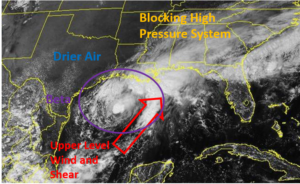Hurricane Teddy headed for Nova Scotia on Monday night as Tropical Storm Beta reached the coast of Texas. At 11:00 p.m. EDT on Monday the center of Hurricane Teddy was located at latitude 35.6°N and longitude 61.5°W which put it about 630 miles (1015 km) south of Halifax, Nova Scotia. Teddy was moving toward the north at 25 m.p.h. (41 km/h). The maximum sustained wind speed was 100 m.p.h. (160 km/h) and there were wind gusts to 120 m.p.h. (195 km/h). The minimum surface pressure was 956 mb.
A Tropical Storm Warning was in effect for the south coast of Nova Scotia from Digby to Meat Cove. Tropical Storm Watches were in effect for the portions of the coast from Meat Cove to Tidnish and from Digby to Fort Lawrence. Tropical Storm Watches were also in effect for Prince Edward Island, the Magdalen Islands and from Port aux Basques to Francois, Newfoundland.
The circulation around Hurricane Teddy expanded as it began a transition to an extratropical cyclone. Winds to hurricane force extended out 100 miles (160 km) from the center of Teddy. Winds to tropical storm force extended out 275 miles (445 km) from the center. Drier air was wrapping around the southern side of Hurricane Teddy. The strongest thunderstorms were in bands in the northern half of the hurricane. Bands in the southern half of the circulation consisted primarily of showers and lower clouds.
An upper level trough over eastern North America will cause strong southerly winds which will blow toward the top of Hurricane Teddy. Those winds will cause strong vertical wind shear and they will contribute to the extratropical transition of Teddy. Hurricane Teddy will move over much cooler water when it approaches Nova Scotia. Teddy will transform into a strong extratropical cyclone.
Hurricane Teddy will be steered rapidly toward the north by the upper level trough over eastern North America. On its anticipated track Hurricane Teddy will approach Nova Scotia on Tuesday night. Teddy will bring strong winds and heavy rain to Nova Scotia and southwestern Newfoundland.
Elsewhere, slow moving Tropical Storm Beta reached the coast of Texas on Monday night. At 11:00 p.m. EDT on Monday the center of Tropical Storm Beta was located at latitude 28.4°N and longitude 96.3°W which put it about 5 miles (10 km) east of Port O Connor, Texas. Beta was moving toward the northwest at 3 m.p.h. (5 km/h). The maximum sustained wind speed was 45 m.p.h. (75 km/h) and there were wind gusts to 60 m.p.h. (95 km/h). The minimum surface pressure was 999 mb.
A Tropical Storm Warning was in effect for the portion of the coast from Port Aransas, Texas to Morgan City Louisiana.
Tropical Storm Beta weakened gradually on Monday as it moved slowly toward the coast of Texas. Drier air continued to get pulled into the circulation which limited the development of new thunderstorms. Without updrafts and downdrafts to transport momentum vertically, the circulation around Beta slowly spun down.
Even though Tropical Storm Beta weakened on Monday, its winds pushed water toward the coast of Texas. Water levels rose along the coast and there were some reports of damage. Waves contributed to beach erosion. Moderate rain was falling over the region between Houston and Victoria, Texas. The rain could cause flooding in some locations.
Tropical Storm Beta was forecast to move slowly toward the northeast along the coast of Texas during the next 24 to 36 hours. Beta will continue to weaken, but winds will blow water toward the coast from several more days. Locally heavy rain will continue to create a risk of floods until Tropical Storm Beta moves away from the area.

